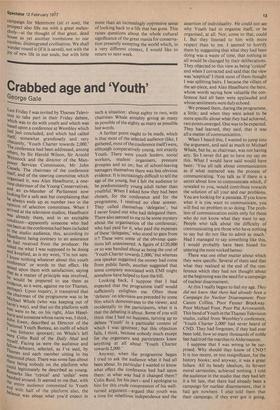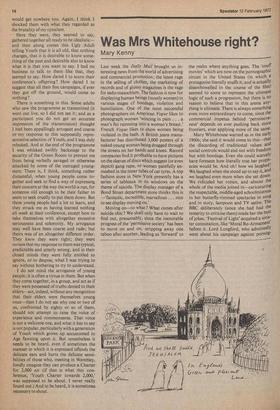Crabbed age and 'Youth'
George Gale
Last Friday I was invited by Thames Television to take part in their Friday debate, which was to do with youth and which was based upon a conference at Wembley which !lad just concluded, and which had called Itself, somewhat grandiosely and very 13hscurely, 'Youth Charter towards 2,000.' The conference had been addressed, among others, by Sir Harold Wilson, Sir Arnold leVeinstock and the director of the ManPower Services Commission, Mr John Cassels The chairman of the conference itself, and of the steering committee which orga
oised it, was Alan Haselhurst, a one
"me chairman of the Young Conservatives, and an ex-Member of Parliament now looking for a safe seat but complaining that he.always ends up as number two in the °Pinion of selection committees. When I arrived at the television studios, Haselhurst was already there, and in an excitable condition—apparently someone who had !lot been at the conference had been included in the studio audience, this, according to 1,1aselhurst being contrary to an assurance ne had received from the producer. He asked me what I was supposed to be doing aincl breplied, as is my wont, 'I'm not sure. know nothing whatever about this youth conference' or words to that effect. He se. ized upon them with satisfaction, saying ,that as a matter of principle was involved, ne. would be prepared to use them as evIclence, as it were, against me (or Thames, rhaPs). Upon inquiry, it transpired that _fie chairman of the programme was to be ;41chael Whale (who was keeping out of h.ms way), and that on the platform with rim were to be, on his right, Alan Haseljourst and someone whose name was, I think, Ewen, described as Director of the , ational Youth Bureau, an outfit of which ' was hitherto ignorant; on Whale's left were Colin Reid of the Daily Mail and ..rnYself. Facing us were the audience and r debaters, selected, as I've said, by names and each member sitting in his gi,131)0inted place. There was some fuss about Ilere being nobody on the platform who cikould legitimately be described as young. "larks like 'typical' and 'unfair' were `,1,anclied around. It seemed to me that, with 'Ile entire audience committed to Youth tnd with half of the platform also, the ualance was about what you'd expect in
such a situation: about eighty to two, with chairman Whale amiably giving as many as possible of the eighty as many as possible last words.
A further point ought to be made, which is that most of the selected audience (like, I gathered, most of the conference itself) were, although comparatively young, not exactly Youth. There were youth leaders, social workers, student organisers, pressure groupies and so on; but of school-leaving teenagers themselves there was less obvious evidence. It is increasingly difficult to tell the age of the young, but [felt the audience to be predominantly young adult rather than youthful. When I asked how they had been chosen, for the conference and for the programme, I received no clear answer. They called themselves 'delegates'; but I never found out who had delegated them. There also seemed to me to be some mystery about the organisation of the conference; who had paid for it, who paid the expenses of these 'delegates,' who stood to gain from it? These were some of the obvious questions left unanswered. A figure of £120,000 or so was bandied about as being the cost of 'Youth Charter towards 2,000,' but whereas one speaker suggested the money had come from public funds, another suggested that some company associated with EMI might somehow have helped to foot the bill.
Looking back, I suppose that I had expected that the programme itself would sufficiently enlighten me. Often these 'debates' on television are preceded by some film which demonstrates to the viewer, and incidentally to the participants, what it is that the debating is about. Some of you will think that I had no business, turning up to debate 'Youth' in a particular context of which I was ignorant; but this objection fails, I think, because nobody much except for the organisers and participants knew anything at all about 'Youth Charter towards 2,000.'
Anyway, when the programme began I tried to ask the audience what it had all been about. In particular I wanted to know what effect the conference had had upon them: in what way had it changed them? Colin Reid, for his part—and I apologise to him for this crude compression of his wellturned argument—argued that youth was a time for rebellious independence and the assertion of individuality. He could not see why Youth had to organise itself, or be organised, at all. Nor, come to that, could I. But they listened to him with more respect than to me. I seemed to horrify them by suggesting that what they had been doing was a waste of time, that nothing at all would be changed by their deliberations. They objected to this view as being 'cynical' and when I corrected and said that the view was 'sceptical' I think most of them thought I was splitting hairs. I became the villain of the set-piece, and Alan Haselhurst the hero, whose words saying how valuable the conference had all been were applauded and whose sentiments were duly echoed.
We pressed them, during the programme, a little; and when they were asked to be more specific about what they had achieved, two points emerged. One was to be expected. They had learned, they said, that it was all a matter of communication.
When I heard this, I wanted to jump into the argument, and said as much to Michael Whale, but he, as chairman, was not having any. So I never did get to have my say on this. What I would have said would have been: 'You all talk about communication as if what mattered was the process of communicating. You talk as if there is a secret about how to communicate which, if revealed to you, would contribute towards the solution of all your and our problems. You are looking for a panacea. If you know what it is you want to communicate, you will find no problem in so doing. The problem of communication exists only for those who do not know what they want to say. People who talk about the difficulty of communicating are those who have nothing to say but do not like to admit as much.' Had I managed to say something like this, 1 would probably have been hissed for uttering the most wicked heresy.
There was one other matter about which they were specific. Several of them said that what they realised at the end of the conference which they had not thought about at the beginning was the need for a campaign of nuclear disarmament.
At this I really began to feel my age. They did not know that there had already been a Campaign for Nuclear Disarmament. Poor Canon Collins. Poor Fenner Brockway. Poor Michael Foot. Poor Pat Arrowsmith. This band of Youth in the Thames Television studio, culled from Wembley's conference, 'Youth Charter 2,000' had never heard of CND. They had forgotten, if they had ever been told, how so many thousands of noble feet had trod the marches to Aldermaston.
I suppose that I was wrong to be surprised. Why should they know of CND? It is too recent, or too insignificant, for the history books; and anyway, it was a great failure. All its heady idealism, its fervent moral certainties, achieved nothing. I told the audience in the studio that they had left it a bit late, that there had already been a campaign for nuclear disarmament, that it had got nowhere. I also told them that their campaign, if they ever got it going, would get nowhere too. Again, I think I shocked them with what they regarded as the brutality of my cynicism.
Here they were, they seemed to say, gathered together all ready to be idealistic— and then along comes this Ugly Adult telling Youth that it is all old, that nothing changes, that it is desirable to know something of the past and desirable also to know what it is that you want to say. I had no business to talk to them like that, they seemed to say. How dared I to scorn their conference's offspring? How dared I to suggest that all their fine campaigns, if ever they got off the ground, would come to nothing?
There is something in this. Some adults who saw the programme as transmitted (it went out live, so I did not see it; and as a participant you do not get an accurate impression of the transmission) thought I had been appallingly arrogant and coarse in, my response to this supposedly representative selection of Youth, and I was duly rebuked. And at the end of the programme I was whisked swiftly backstage to the security of the Green Room to prevent me from being verbally savaged or otherwise attacked by some of the outraged youngsters. There is, I think, something rather distasteful, when young people come together and seek to find a way of expressing their concern at the way the world is run, for someone old enough to be their father to seem to seek cruelly to put them down. But these young people had a lot to learn, and they struck me as having learned nothing all week at their conference, except how to take themselves with altogether excessive seriousness and solemnity. My arrogance may well have been coarse and rude; but theirs was of an altogether different order. They knew they Were right; they were certain that my response to them was typical, predictable and utterly wrong; and in their closed minds they were fully entitled to ignore, or to despise, what I was trying to say without bothering to try to understand.
I do not mind the arrogance of young people; it is often a virtue in them. But when they come together, in a group, and act as if they were possessed of truths denied to their elders—act, indeed, without any recognition that their elders were themselves young once—then I do not see why one or two of us, confronted by eighty or so of them, should not attempt to raise the voice of experience and commonsense. That voice is not a welcome one, and what it has to say is not popular, particularly with a generation of Youth which grows up accustomed to Age fawning upon it. But nonetheless it needs to be heard, even if sometimes the manner in which it is expressed offends the delicate ears and hurts the delicate sensibilities of those who, meeting in Wembley, fondly imagine they can produce a Charter for 2,000 AD (if that is what this conference, `Youth .Charter towards 2,000,' was supposed to be about. I never really found out.) And to be heard, it is sometimes necessary to shout.



































 Previous page
Previous page